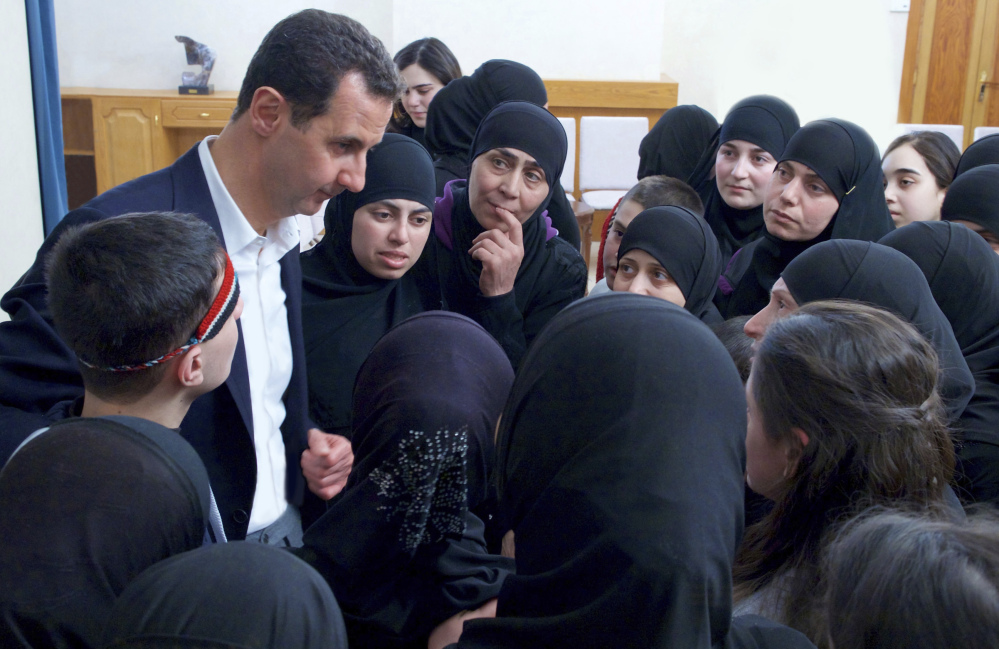The Syrian government commits an atrocity. The United States and the United Nations denounce it. Nothing happens.
It’s a pattern that experts say will likely continue with the revelation this past week that, since 2011, officials at a military prison in Syria have summarily executed as many as 13,000 people by hanging.
A U.N. spokesman called the executions “horrifying.”
Amnesty International, which documented the killings, concluded that they were part of a systematic government policy, and constituted crimes against humanity. The group called on the U.N. to investigate the prison and other detention centers, and to act immediately to end the crimes.
“Inaction would be unconscionable,” its report said.
But inaction has been the norm.
In 2012, President Obama warned Syrian President Bashar Assad that using chemical weapons would constitute a “red line” that justified U.S. military action. But when Assad crossed that line a year later, Obama balked.
As the Syrian government barrel-bombed civilians, conducted airstrikes on hospitals and laid siege to the city of Aleppo, the U.S. issued more denunciations, increased economic sanctions and even armed a small number of rebels.
Obama could never persuade Congress or other world leaders to launch a military campaign in Syria. Part of the problem is that Russian President Vladimir Putin has been a staunch ally of Assad.
Nor has the international community taken serious action toward prosecuting war crimes committed there.
The U.N. has several options, said Alex Whiting, a professor at Harvard Law School and a former war crimes and genocide prosecutor.
The Security Council could refer the matter to the International Criminal Court, as it did in Libya just weeks after fighting began there in 2011.
It could create a war tribunal, as it did after reports of war crimes emerged in the former Yugoslavia in 1993.
Or if a peace deal were imminent, the U.N. could ensure that its terms included a tribunal, as was agreed to in South Sudan in 2015.
“Where there is political will and political agreement the Security Council can act very quickly,” Whiting said. “The problem is that the five permanent members of the Security Council have to agree.”
On Syria, they have not, which explains why the U.N.’s action has been so limited.
The U.N. established a commission to investigate human rights violations and war crimes in Syria and concluded that the Syrian state slaughtered detainees en masse.
In 2014, the Security Council considered a resolution to refer the crimes to the International Criminal Court, but Russia and China vetoed it. Other resolutions to condemn human rights abuses in Syria, impose diplomatic or economic sanctions and demand cease-fires have similarly failed.
“It’s really a disgrace that as of today there is still no accountability mechanism that would bring the perpetrators of these crimes against humanity to justice,” said Susannah Sirkin, who directs international policy for the group Physicians for Human Rights.
In December, the U.N. General Assembly voted to establish an investigative team to gather and analyze evidence of human rights violations and crimes in Syria.
Its members have yet to be chosen, and unlike the International Criminal Court or a war tribunal, the team cannot legally compel Syria to cooperate.
Leon Wieseltier, a senior fellow at the Brookings Institution, said the only way to stop Assad would have been through military action. “If your objective is to stop horror, you need to do it with force,” he said.
Wieseltier said he understood Obama’s reluctance to become entangled in another war in the Middle East, but he argued that Obama could have taken narrow, targeted actions, such as grounding Assad’s air force.
“There was a moral emergency and a strategic emergency, and we didn’t do anything,” he said. “And what happened as a consequence of our opening this vacuum is that Putin rushed to fill it.”
Wieseltier said the window of opportunity may have passed, both because the conflict in Syria has escalated and there is even less political will in the U.S.
“Trump is an America firster,” he said. “He has no inclination either to introduce American power abroad or to challenge Putin.”
Under international law, foreign military intervention is generally illegal except in self-defense, at the invitation of another country or upon the authorization of the U.N. Security Council.
But some scholars have argued that humanitarian intervention is another valid reason.
“There are several historical cases where … states have used force to stop a humanitarian catastrophe without authorization,” said Ryan Goodman, a New York University professor of international law. “If you build enough cases, you can say there is a legal norm.”
In 1999, for example, NATO bombed Kosovo to end the killing of thousands of ethnic Albanians by Serbs.
Though the 11-week air assault was not authorized by the Security Council, it was ultimately deemed by many in the international community to be “illegal but legitimate” for humanitarian reasons, Goodman said.
“The conditions in Syria clearly meet whatever threshold one would require to justify a humanitarian intervention,” he said.
Send questions/comments to the editors.



Success. Please wait for the page to reload. If the page does not reload within 5 seconds, please refresh the page.
Enter your email and password to access comments.
Hi, to comment on stories you must . This profile is in addition to your subscription and website login.
Already have a commenting profile? .
Invalid username/password.
Please check your email to confirm and complete your registration.
Only subscribers are eligible to post comments. Please subscribe or login first for digital access. Here’s why.
Use the form below to reset your password. When you've submitted your account email, we will send an email with a reset code.